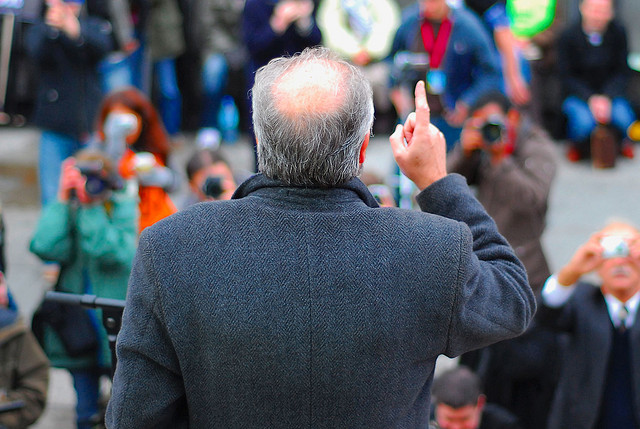The contest in Bradford West shows British democracy in all its technicolour glory
A passionate contest in Bradford West, which pitted the incumbent Respect party MP George Galloway against the Labour Party’s challenger Naz Shah was one of the highlights of Britain’s 2015 general election. Parveen Akhtar tells the remarkable story of the election from a changing city.
Bradford West was one of the most anticipated results of the United Kingdom general election on 8 May 2015. Few constituency battles in British political history have been so publically rancorous, personally hostile and, at times, quite so utterly bizarre. At its centre was a bitter clash between the Respect Party’s leader and maverick candidate, George Galloway, and the new-to-politics Labour candidate, Naz Shah.
The election result was declared just after 6am on Friday morning: Galloway was no longer a member of the British parliament. Shah had won a decisive victory with a majority of 11,420 votes. She received 50% of the votes cast, over twice that of Galloway who came in at 21.2%. The share of votes for the remaining six candidates was as follows: George Grant (Conservative), 15.3%; Harry Boota (UKIP), 7.8%; Alun Griffiths (Liberal Democrat), 2.9%; Celia Hickson (Green), 2.7%; James Kirkcaldy (Independent), 0.2%; and Therese Hirst (English Democrats), 0.2%.
Smears and character assassinations had characterised the political campaign in the constituency, and Shah referred to this in her acceptance speech: “I thank all my opponents, with the exception of one, who all convicted themselves really deeply to, and fought to be elected on, issues and in the spirit of friendly rivalry. To Mr Galloway I say that your campaign demeaned our democracy but personal attacks on me have not worked. The people of Bradford West have seen through this and you have been sent on your way.”
Taking his turn at the podium, Galloway declared: “I don’t begrudge the Labour members here their moment of celebration of course. But there will be others who are already celebrating: the venal, the vile, the racists and the zionists will all be celebrating. The hyena can bounce on the lion’s grave but it can never be a lion and in any case, I’m not in my grave. As a matter of fact I’m going off now to plan the next campaign.”
Galloway has had a long career in politics. He served as an MP for three separate constituencies, first representing Glasgow Hillhead between 1987 and 1997. When boundary changes saw the constituency abolished and replaced by Glasgow Kelvin, Galloway served there between 1997 and 2005. This was followed by a five-year stint in the London constituency of Bethnal Green and Bow after Galloway stood and won on an anti-war platform against Labour’s Oona King in the general election of 2005.
Two years later, after failing to secure Poplar and Limehouse in the 2010general election, Galloway was back in parliament again via a spectacularvictory in a by-election in Bradford West. He won a 10,000-plus majority against the Labour Party’s Imran Hussain. Incidentally, Hussain securedparliamentary office last week in the neighbouring constituency of Bradford East.
Naz Shah, by comparison, had no background in politics. Three months earlier, in February 2015, she had failed to be selected as the parliamentary candidate for Bradford West. In a ballot, the local Labour Party selected instead Amina Ali, a non-Bradfordian British Somali councillor from Tower Hamlets in east London. Naz Shah received only thirteen of the 238 votes cast. In a turn of events be-fitting the high drama politics of the constituency, Ali resigned her candidacy after seventy-two hours, citing personal reasons.
Galloway described the selection process as a “supernova shambles”, and attributed the resignation to antagonisms between the local and national Labour party. Shah then was Labour’s second-choice candidate. At a hustings in the Carlisle Business Centre, in one of the many sensational moments of this campaign, Galloway alleged that Shah, after failing to secure the Labour Party candidate selection in Bradford West, had contacted the Respect Party in a bid to become Respect’s candidate for Bradford East. Regardless of the veracity of the claim (she said she had been joking), Naz Shah is now a Labour Party member of parliament.
Galloway had been a household name in British politics long before the general election of 2015. In the run up to this election, Shah quickly made a name for herself too. An autobiographical account of her childhood published with theUrban Echo garnered both sympathy and support. Naz Shah is the daughter of Zoora Shah, who in 1993 was convicted of and imprisoned for the murder of her partner, Mohammed Azam. Aged 18, Shah was left to look after her two younger siblings and successfully campaigned with Southall Black Sisters for the early released of her mother.
Zoora Shah had been subjected to both physical and sexual abuse throughout her relationship with Azam, and fearing for Naz’s safety sent her to Pakistan at the age of 12 where she was, aged 15, subjected to a forced marriage. Galloway disputed the age of the marriage, claiming that he had her originalnikka (marriage document) which proved she was 16 years and a half, and accused her of slandering the Pakistani community and playing into “every stereotype”. Shah refuted the allegation and pledged to sue Galloway.
Claims and counter-claims – of lying, possible defections, slandering and threats of future court proceedings – marred the 2015 election campaign. But even before then, the constituency was embroiled in charges of clientelism. For years, politicians had co-opted Pakistani community leaders, often kinship orbiraderi elders, into relationships of patronage. Politicians would confer local status and positions of power onto these community gatekeepers in exchange for bloc community votes. Such a system, which privileged older males within the British Pakistani community, left many women and young people disillusioned and effectively disenfranchised from the political process. In 2012, Galloway had galvanised these very people, offering them an alternative tobiraderi politics. The result was a surge of political optimism and expectation, and Galloway swept into power, in large part, on this anti-biraderi rhetoric.
Three years on: what happened to optimism?
In 2012, Galloway was an unknown quantity in Bradford West. He promised change and many people bought into the promise. After being in office for three years he was held to account for the perceived (non)-deliverance of change. Related to this was the widespread view that Galloway was never around. Indeed, Shah referred to him as the “absentee MP” and alleged that he was only ever in town when there was an election to be fought. Galloway openly admitted to liking elections “more than I like serving”.
Galloway also alienated a number of voters, especially women, with his comments on rape and sexual etiquette, and also with his campaign focus on Naz Shah’s personal life. In 2012, he had won office by bringing women on board; he had bought them into the political conversation in a way that they had not experienced before in Bradford. But many connected to Naz Shah. Marriages – arranged, forced and broken – were a part of their lived experience, and Galloway, by attacking Shah, estranged the very women whom he had attracted last time around.
Galloway had an international media profile, and he said of himself that he was a politician of international standing. But the missing link was how this impacted on the lives of the constituents on his doorstep. As one young Pakistani coming out of a polling station on 8 May commented: “you can talk about Palestine and Zionism all you like but that doesn’t help the people of Bradford West and East”. Furthermore, it was clear that voters wanted weekly rubbish collections and litter off the streets. International politics and foreign affairs were less important than everyday life in Bradford.
There was also a belief that Galloway’s 2015 election strategy was to utilise the very biraderi networks which he had campaigned against in 2012. He appeared publicly with Imran Hussain, his labour rival from 2012, who was seen to have been embedded in local biraderi politics.
In the many hustings held in Bradford West the prospective parliamentary candidates were scrutinised closely. Shah, for example, was questioned over her position on key issues ranging from education to the Preventing Violent Extremism agenda. “We know everything about your private life but nothing about your policies”, she was told. Galloway was held to task for his lack of presence in the city and his voting record in parliament. In defending him against allegations of absenteeism Galloway’s facebook page declared: “Where’s George? He’s on Question Time, he’s on Newsnight, he’s on Channel 4 News, he’s giving speeches in Parliament, he’s campaigning with Hugo Chávez on the streets of Venezuela, he’s known around the world. Can anybody who’s standing against me in this election say that?”
But in the end, it was his absence from the streets of Bradford which mattered most. Having re-enfranchised people in the city, the result showed that, lion or not, even he could not take their vote for granted.
—
Note: This post originally appeared on Open Democracy and is reposted with the permission of the author. It represents the views of the author and not those of Democratic Audit UK or the LSE. Please read our comments policy before posting.
—
 Parveen Akhtar is a lecturer in sociology at the University of Bradford, specialising in political participation, Islam, migration and social change. She is the author of British Muslim Politics: Examining Pakistani Biraderi Networks(Palgrave, 2013), and has published articles in the British Journal of Politics and International Relations, the Political Quarterlyand European Political Science
Parveen Akhtar is a lecturer in sociology at the University of Bradford, specialising in political participation, Islam, migration and social change. She is the author of British Muslim Politics: Examining Pakistani Biraderi Networks(Palgrave, 2013), and has published articles in the British Journal of Politics and International Relations, the Political Quarterlyand European Political Science






 Democratic Audit's core funding is provided by the Joseph Rowntree Charitable Trust. Additional funding is provided by the London School of Economics.
Democratic Audit's core funding is provided by the Joseph Rowntree Charitable Trust. Additional funding is provided by the London School of Economics.
… [Trackback]
[…] Read More here: democraticaudit.com/?p=13139 […]
A really good read on how democracy, in all in colourful glory, played out in the #BradfordWest #GeneralElection https://t.co/5U7Z55TqYl
Yes, all us vile zionist hyenas are celebrating Galloway’s defeat. What an arse. Good riddance. https://t.co/5qL6fLm4u3
The contest in Bradford West shows British democracy in all its technicolour glory https://t.co/ACMlWz6Awj
I don’t know abt that, but it was GREAT to watch Galloway get pumped lol https://t.co/mEkX88SYEz
The contest in Bradford West shows British democracy in all its technicolour glory… https://t.co/E4kAm6Bu4r
The contest in Bradford West shows British democracy in all its technicolour glory https://t.co/P9oSror1tp #Option2Spoil
The contest in Bradford West shows British democracy in all its technicolour glory https://t.co/O9sy3nHvkx